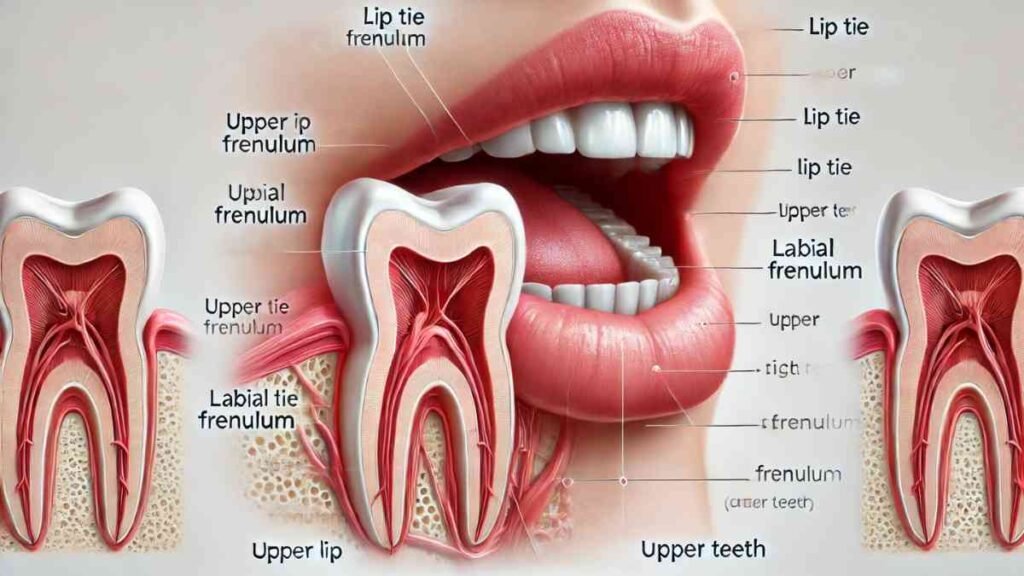Introduction
Lip ties, a condition where the labial frenulum (the tissue connecting the upper lip to the gum) is too tight or thick, often go unnoticed during childhood. However, untreated lip ties can lead to various complications as one grows older, affecting dental health, speech, eating habits, and even sleep. This article explores the long-term effects of lip ties, their symptoms, and treatment options, providing insights to help individuals manage this condition effectively.
What is a Lip Tie?
A lip tie occurs when the frenulum is overly restrictive, limiting the movement of the upper lip. While often diagnosed in infancy due to feeding difficulties, it can persist into adulthood if left untreated, causing a range of physical and functional problems.
Common Lip Tie Problems Later in Life
1. Dental Complications
Lip ties can lead to:
- Gaps Between Teeth (Diastemas): The tension from the frenulum may prevent the upper teeth from coming together properly.
- Tooth Decay and Gum Issues: Difficulty in maintaining oral hygiene around the tight frenulum can result in plaque buildup, cavities, and gum disease.
- Orthodontic Challenges: Misaligned teeth caused by lip ties often require complex orthodontic treatment to correct.
2. Speech Impairments
Lip ties can restrict lip mobility, making it harder to pronounce certain sounds clearly. This may result in speech difficulties, such as lisping or struggling with specific consonants. These issues can impact social interactions and self-confidence.
3. Eating and Digestive Issues
In infancy, lip ties often lead to breastfeeding difficulties. In later life, this condition may cause:
- Discomfort while eating or drinking.
- Improper chewing and swallowing, potentially leading to digestive problems over time.
4. Aesthetic Concerns
For some individuals, the physical appearance of a lip tie can affect their self-esteem. The visible gap between teeth or the restricted upper lip movement may cause cosmetic dissatisfaction.
5. Sleep-Related Disorders
Restricted oral structures can impact airway function during sleep, increasing the risk of snoring and sleep apnea. These conditions can lead to fatigue, reduced concentration, and long-term health issues.
Diagnosing a Lip Tie
Symptoms to Watch For:
- Difficulty brushing or flossing the upper front teeth due to the tight frenulum.
- Persistent gaps between the upper front teeth despite orthodontic treatment.
- Difficulty pronouncing specific sounds or maintaining speech clarity.
- Discomfort while eating certain foods.
Professional Evaluation:
A dentist, orthodontist, or pediatric specialist can assess the severity of the lip tie and recommend appropriate interventions.
Treatment Options for Lip Tie Problems
1. Frenectomy
A frenectomy involves surgically releasing the tight frenulum to allow greater lip mobility. This procedure is quick, minimally invasive, and can be performed using scissors or lasers.
2. Speech Therapy
For individuals with speech difficulties, working with a speech therapist can improve articulation and address any residual speech issues after a frenectomy.
3. Orthodontic Treatment
Misaligned teeth caused by a lip tie may require braces or retainers to correct. Early intervention often simplifies treatment, but adults can also benefit from orthodontic care.
4. Myofunctional Therapy
This therapy focuses on retraining oral and facial muscles to function optimally. It can complement surgical or orthodontic treatments by improving overall oral health.
Preventing Lip Tie Problems
Early diagnosis and treatment are key to avoiding long-term complications. Parents should seek evaluation for infants showing feeding difficulties, and adults experiencing persistent issues should consult healthcare professionals.
Why Awareness Matters
The hidden challenges of lip tie problems later in life emphasize the importance of early intervention and proper management. Understanding this condition empowers individuals to seek timely solutions and improve their quality of life.
Conclusion
Lip tie problems later in life can affect multiple aspects of health and well-being, from dental and speech issues to sleep and self-confidence. Awareness and appropriate intervention, whether surgical, therapeutic, or orthodontic, can mitigate these challenges effectively. If you suspect a lip tie in yourself or a loved one, consulting a specialist is the first step toward better health and improved functionality.
For More Visit, MirrorMagazine.co.uk


